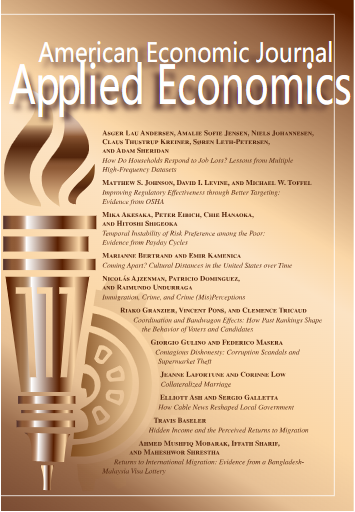公共采购中企业行为障碍的员工成本
IF 6.2
1区 经济学
Q1 ECONOMICS
引用次数: 2
摘要
本文研究了一项反腐败政策——企业制裁或黑名单——以了解披露非法企业行为和对这些行为的制裁如何影响企业和工人的结果。利用巴西对腐败公司实施更严厉惩罚的政策变化,我发现,腐败与就业大幅下降和退出正规部门的可能性增加有关。我还记录了工人的年收入在失业后会下降。这些影响是由政府合同收入的损失造成的。调查结果揭示了工人在衡量打击腐败的后果时所付出的代价。(凝胶d73, e26, h57, h83, j31, k42, o17)本文章由计算机程序翻译,如有差异,请以英文原文为准。
The Employee Costs of Corporate Debarment in Public Procurement
This paper studies an anticorruption policy—corporate debarment, or blacklisting—to understand how disclosing illicit corporate practices and the sanctions for these practices affect firm and worker outcomes. Exploiting a policy change in Brazil that imposed stricter penalties for corrupt firms, I find that debarment is associated with a sizable decline in employment and an increase in the probability of exiting the formal sector. I also document that workers’ annual earnings fall after debarment. The impacts are driven by lost revenues from government contracts. The results shed light on the costs to workers in weighing the consequences of corruption crackdown. (JEL D73, E26, H57, H83, J31, K42, O17)
求助全文
通过发布文献求助,成功后即可免费获取论文全文。
去求助
来源期刊

American Economic Journal-Applied Economics
ECONOMICS-
CiteScore
9.10
自引率
1.60%
发文量
63
期刊介绍:
American Economic Journal: Applied Economics publishes papers covering a range of topics in applied economics, with a focus on empirical microeconomic issues. In particular, we welcome papers on labor economics, development microeconomics, health, education, demography, empirical corporate finance, empirical studies of trade, and empirical behavioral economics.
 求助内容:
求助内容: 应助结果提醒方式:
应助结果提醒方式:


